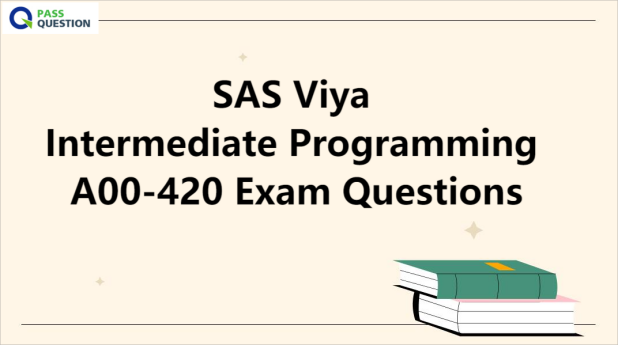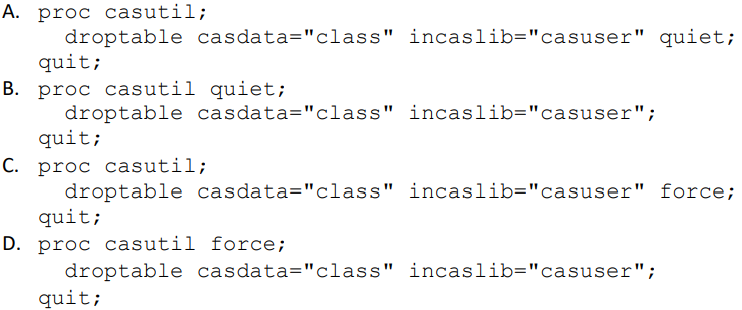SAS Viya Intermediate Programming A00-420 Exam Questions
If your goal is to obtain the prestigious SAS Viya Programming Specialist certification, it is essential that you successfully pass the A00-420 SAS Viya Intermediate Programming examination. PassQuestion is a reliable resource that provides the most up-to-date SAS Viya Intermediate Programming A00-420 Exam Questions designed to cover all the topics, ensuring that you can pass your exam easily. Utilizing this SAS Viya Intermediate Programming A00-420 Exam Questions not only equips you with the knowledge to pass the exam but also allows you to clear all your doubts about the subject matter.

SAS Viya Programming Specialist Certification
To obtain the SAS Viya Programming Specialist certification, there are several key areas of knowledge and skill that you will need to master.
- Work with CAS tables and data sources.
- Use CAS-enabled procedures and user-defined formats.
- Modify DATA step and SQL programs to run in CAS.
- Use the CAS programming language (CASL) and CAS actions to directly interact with data in CAS.
Exam Information
SAS Viya Intermediate Programming
Exam ID: A00-420
This exam is administered by SAS and Pearson VUE.
65-70 multiple choice and short-answer questions.
110 minutes to complete exam.
Passing score is 71%.
Certification expires after 5 years.
Cost: $180
Exam Objectives
The following objectives will be tested on the exam.
5-10% – Programming in SAS Viya concepts.
10-15% – Managing data with CAS-enabled procedures.
10-15% – DATA step and SQL programming in CAS.
5-10% – CAS-enabled procedures and user-defined formats.
15-20% – CAS language basics.
5-10% – Access data with CAS actions.
5-10% – Explore and validate data with CAS actions.
20-25% – Prepare data with CAS actions.
5-10% – Analyze and summarize data with CAS actions.
View Online SAS Viya Intermediate Programming A00-420 Free Questions
1. Which statement is true about SAS Viya?
A. It contains the SAS launcher server, which is the primary server for processing big data.
B. It supports only single-threaded DATA step processing.
C. It can employ multiple servers to execute programs.
D. Its primary interface for submitting programs is the SAS Windowing Environment.
Answer: C
2. You want to use the MEANS procedure to summarize data using the CAS server. Which statement is true?
A. Statistics that are supported by PROC MEANS are also supported on the CAS server.
B. You must specify a CAS engine libref with the input table name.
C. You must sort the data before using BY-group processing on the CAS server.
D. All PROC MEANS statements are supported for CAS processing.
Answer: B
3. Which DATA step function is supported in CAS?
A. SYMGET
B. CATX
C. FILEREF
D. RANUNI
Answer: B
4. Which CASL program will fetch all 428 rows from the cars table?
A. proc cas;
table.fetch /
table={name=”cars”, caslib=”casuser”},
from=1,
to=1000;
quit;
B. proc cas;
table.fetch /
table={name=”cars”, caslib=”casuser”},
from=1,
to=_all_;
quit;
C. proc cas;
table.fetch /
table={name=”cars”, caslib=”casuser”},
from=1,
to=_maxrows_;
quit;
D. proc cas;
table.fetch /
table={name=”cars”, caslib=”casuser”},
from=1;
quit;
Answer: A
5. Given the following SAS program?
caslib _all_ assign;
proc sgplot data=casuser.cars;
vbar Make;
run;
What will the program do?
A. Produce an error because the SGPLOT procedure cannot access the CAS table.
B. Execute the SGPLOT procedure on the CAS server.
C. Summarize the results in CAS and process the summarized results on the Compute Server.
D. Transfer the data to the Compute Server and then execute the SGPLOT procedure.
Answer: D
6. Which table.update parameter specifies the column to update?
A. Assign
B. Update
C. Set
D. ComputedVars
Answer: C
7. The regnm format has been created and stored in an CAS format library. Which program associates the format regnm with the region column in the orders table?
A. proc casutil;
load data=work.orders casout=”orders” outcaslib=”public”;
format region regnm.;
quit;
B. proc casutil;
load data=work.orders casout=”orders” outcaslib=”public”
format=yes;
format region regnm.;
quit;
C. proc casutil;
format region regnm.;
load data=work.orders casout=”orders” outcaslib=”public”
format=yes;
quit;
D. proc casutil;
format region regnm.;
load data=work.orders casout=”orders” outcaslib=”public”;
quit;
Answer: D
8. Which action from the table action set lists the files in a caslib’s data source?
A. tableInfo
B. fileInfo
C. tableDetails
D. caslibInfo
Answer: B
9. The dataPreprocess.impute action preforms data matrix (variable) imputation. Which imputation methods can be used?
A. MIDRANGE, MODE, RANDOM, VALUE
B. MIDRANGE, MODE, RANDOM, CUSTOM
C. MODE, RANDOM, VALUE, CUSTOM
D. MIDRANGE, RANDOM, VALUE, CUSTOM
Answer: A
10. Which PROC CASUTIL step suppresses error messages if the table is not found in-memory?

A. Option A
B. Option B
C. Option C
D. Option D
Answer: A
